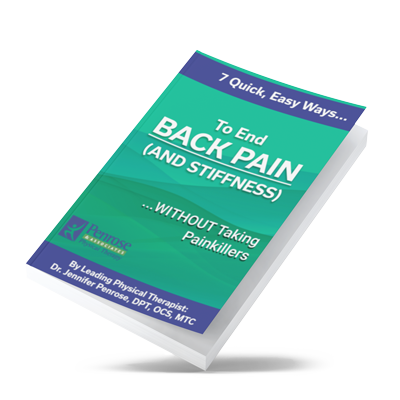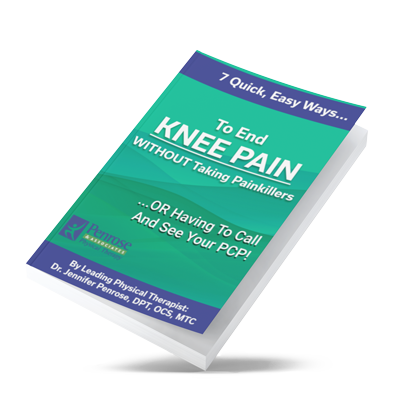LACEY (WA) – So far in this series on knee pain, we’ve covered a lot of different topics. We’ve looked at the 3 things you could be doing that make knee pain worse, which included wearing the wrong shoes, sitting with your legs bent and taking it too easy. We then looked at the 3 ‘quick fixes’ people think will help knee pain, but don’t. (Painkillers, resting and wearing a support). Next, it was looking at whether knee replacement surgery could be avoided, and how. And most recently, we looked at how to stop arthritis before it stops you.
That’s a lot to cover in just 4 weeks, but we’ve still got more to go! Knee pain is something that a lot of people struggle with at any time of year, but especially in the warmer months, as people tend to be more active. Which leads me to this week’s article…
This question was sent to me yesterday by a reader suffering with knee pain: “Jennifer, I’ve been suffering with on-off type knee pain for more than a year now. What I can’t put my finger on is when it started or why, and what’s more confusing is that my pain gets worse as the day goes on. But whenever I wake up, the pain is gone – or is considerably less. Yet by the end of another day, my knee aches, sometimes it feels hot and swollen and I’m often in considerable pain – especially if I’ve been out for a long walk with my dog. Any ideas?” – Beth, 58, Lacey.
What’s happening here is likely to be a simple case of the muscles around Beth’s knee joint being “weak”. The muscles just aren’t strong enough to last through the day, or cope with what she wants her body to do and where she wants to go. Think of it like this: When you go to bed at night and are ready to sleep – your body is obviously tired from all of the energy you’ve used throughout the day. Your muscles have been working in order to keep you upright and move your body through space.
In short, when you sleep your body gets a chance to recover, the muscles supporting your knee ache less because they’re less tired and feel “energized” and ready for a new day. But if a muscle, any muscle, is weak or damaged in some way, it’s not going to be able to support you through the long day ahead.
So, somewhere around dinner time, after a lot of “being on your feet”, your muscles will “pack up”. When they do this, joints, such as your knees, are left to fight their own battles. And that’s not good! Particularly if you’re aged 45+… as that’s the period of time where cartilage damage really begins (arthritis) and the boney surfaces of your knee start to rub together.
Without muscles to support these knee joints, or just really tired and weak ones, you’re much more likely to suffer pain or aches. The same thing often happens with neck and shoulder muscles at night too. This is also the reason why when you have the “flu” or a common cold, you always feel worse at night. Have you ever noticed your child get more exhausted than usual as the night draws in if he or she has a virus?
The same thing is occurring: your body puts up a better fight after a good night’s sleep, as it begins to get tired again through the day, the virus or bacteria wins the fight! This boils down to energy expenditure. The body only produces so much energy and this energy is expended throughout the day completing daily tasks, consuming food, etc. Even breathing costs a small amount of energy from the muscle responsible for expanding your lungs (the diaphragm).
So the answer to Beth’s knee problem? Well, it’s likely to be a simple case of strengthening the knee muscles (and hip and lower back ones) to make them stronger. But here’s something people often get wrong: walking a dog everyday will do very little to strengthen muscles – if anything, it will make weak muscles worse. Meaning you’re more likely to suffer more pain, not less. No, the answer is not found in more exercising, it’s in doing the right exercises to strengthen the right muscles, which means your knee will be strong enough to walk. With proper strength conditioning comes walking pain free, and walking pain free means you can keep your heart and lungs healthy without the worry of aches at the end of the day.
The author, Jennifer Penrose, is a Physical Therapist and owner of Penrose Physical Therapy. If you have any questions about knee pain, you can call (360) 456-1444 or email jennifer@penrosept.com
P.S If you want to hear more healthy tips from Dr. Penrose, tune into her monthly podcast “Stay Healthy South Sound” on iTunes, Google Play or Spotify.






